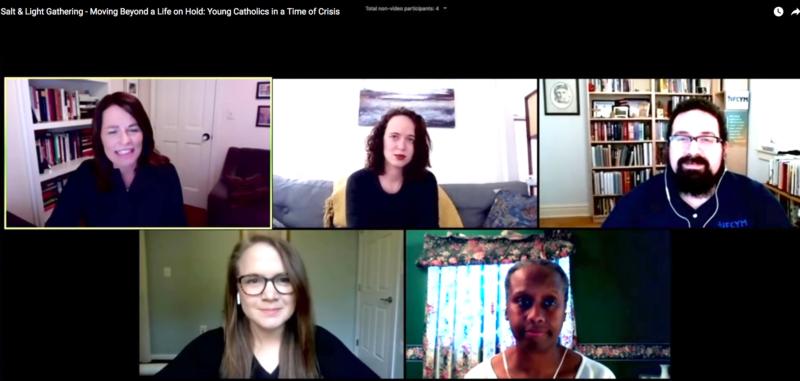WASHINGTON (CNS) — Four panelists participated in a Georgetown University-sponsored virtual discussion April 27 about how the pandemic has not only changed lives but also how young Catholics can serve right now and be models of hope.
The university’s Initiative on Catholic Social Thought and Public Life sponsored its third online Salt and Light Gatherings panel called “Moving Beyond a Life on Hold: Young Catholics in a Time of Crisis.”
(The panel discussion can be viewed here.)
The program is part of a series inviting Catholics under 40 years old who work in Washington to explore ties between faith, Catholic social thought and their work.
[hotblock]
Kim Daniels, moderator and associate director of the initiative, opened the discussion with a quote from Pope Francis about encouraging young people during the pandemic.
“Have the courage to look ahead and to be prophetic,” Pope Francis said. “May the dreams of the old correspond to your prophecies.”
Darius Villalobos, director of diversity and inclusion at the National Federation for Catholic Youth Ministry, said for young people to push through at this time, they must do what’s within their means, which might be difficult to discern right now because many “feel helpless and very disempowered by not being able to do much.”
“Realistically, a lot of us are having to be present through our relationships and checking in on those we care about and those we know,” he added.
Tara Isabella Burton, an author and a columnist for Religion News Service, said the pandemic reminds people of the richness and gift of community.
She and her husband eloped to Central Park and got married right before New York City’s shelter-in-place mandate went into effect. Two witnesses, a priest and several park-goers were present for the couple’s union and stood at least six feet away.
“It was just this marvelous reminder of how enmeshed we are as a community and one another’s lives,” Burton said. “We are not necessarily always conscious of it all the time.”
Villalobos said one blessing of this experience has been a return to the basics of cultivating personal relationships and reaching out to others, especially to those who may be struggling. He noted the old-fashioned ways young people are communicating with loved ones now, such as talking on the phone and writing letters.
He also challenged young people to think about how can they stretch themselves to go outside of their comfort zone and meet people where they are.
[tower]
Kimberly Mazyck, senior manager for engagement and educational outreach at Catholic Charities USA, said there are several opportunities to play an active role in society both remotely and in person.
She recommended the website allforgood.org, which provides remote service opportunities.
Mazyck said graduating college seniors might want to discern if they want to complete a year of service with social justice-oriented programs. She also suggested that young people consider advocacy work, adding: “This is the perfect time to get on the phone, call your senators, call your representatives, let them know how you feel about these things.”
For those considering in-person volunteer opportunities, she said some Catholic Charities agencies are looking for volunteers. Most involvement in the service sites, however, is limited to 14-day increments.
“You may volunteer for 14 days, and then after that, you will take a break for 14 days to make sure you’re not exhibiting any signs of COVID-19,” Mazyck said.
She encouraged those wanting to serve in person to be mindful and prayerful before they decide, however, due to the risks of being on the front lines.
Ashley McKinless, an associate editor at America magazine and co-host of the podcast Jesuitical, said it has been great to have online resources like Zoom and Facebook during this time, but said online connectedness is “making clear to a lot of people that it’s not enough” and maybe a reminder of what “we don’t value enough.”
“We sorely miss being physically present to one another, and we sorely miss receiving the Eucharist in person,” she said.
As she sees it: A new normal is likely to come, and people are in the position to decide what that adjustment looks like, especially within church communities.
A few weeks ago, McKinless was asked to co-chair the adult formation group committee for her parish in Brooklyn, New York. She said during a recent group meeting that they were talking about plans and events for the calendar year before the priest jumped in and mentioned how reality could change for the next year and even after that.
“We took this as a wake-up call,” she said, adding, if we’re not going to be gathering for Mass on Sunday, what does it mean to be a church and what can we do?
Her takeaway from the meeting was discovering the group’s revised role: to become the “listening church that Pope Francis has been calling for since the beginning of this papacy.”
Villalobos said everyone has brought their realities and struggles into this period of unpredictability. Everybody needs to be “honest, open and authentic about where we’re at in this situation to allow grace to work in this moment,” he said.
Despite the difficulties of pandemic, he said: “We are still called to be people of great hope. Let’s be open to where the spirit leads us.”
PREVIOUS: Higher death rates among poor cause for alarm, sister says
NEXT: Watch prayers today for consecration of U.S. to Mary



Share this story